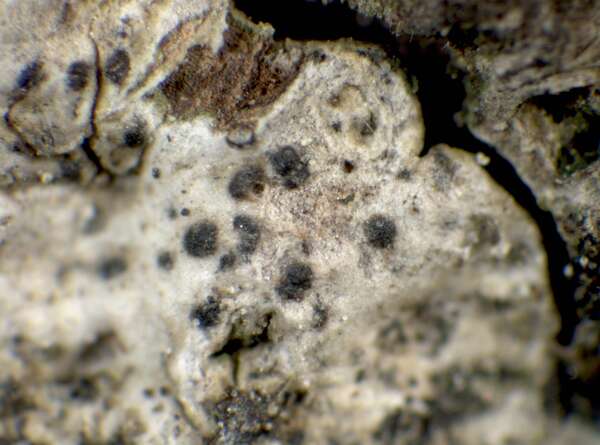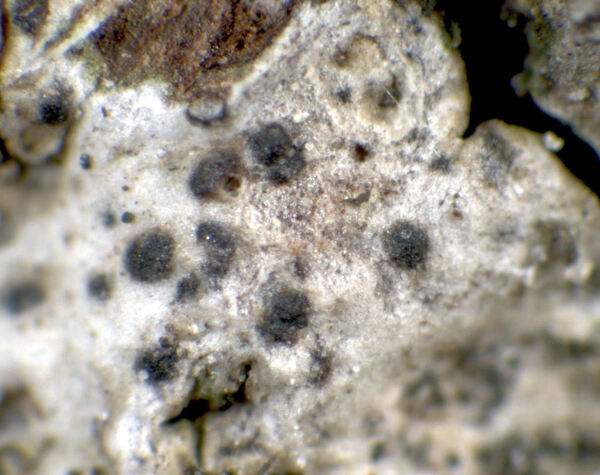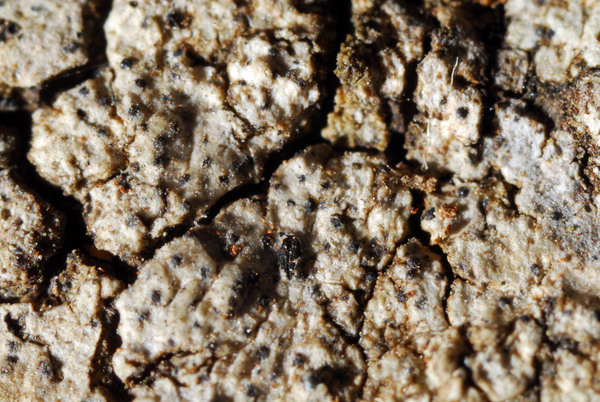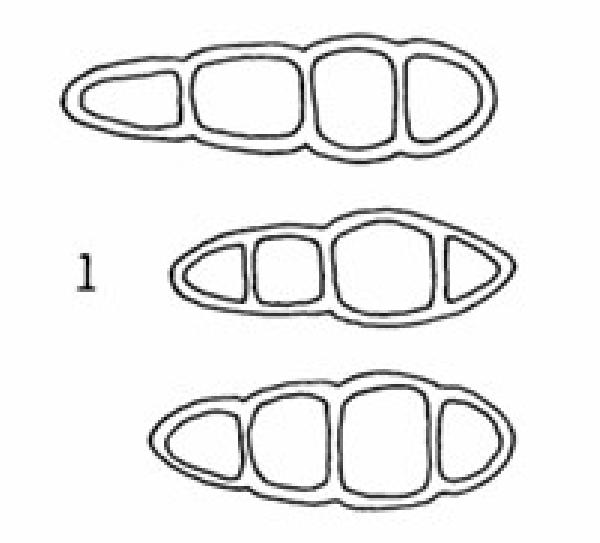Swinscowia affinis (A. Massal.) S.H. Jiang, Lücking & Sérus.
in Hongsanan & al., Fungal Divers.: 10.1007/s13225-020-00462-6, 137, 2020. Basionym: Sagedia affinis A. Massal. - Mem. Lichenogr.: 138, 1853.
Synonyms: Arthopyrenia affinis (A. Massal.) R.C. Harris; Porina affinis (A. Massal.) Zahlbr.; Strigula affinis (A. Massal.) R.C. Harris
Description: Thallus crustose, largely endosubstratic, whitish or pale grey, very thin. Perithecia black, 0.3-0.45 μm across, largely immersed, the upper part rounded or flattened. Involucrellum brown, confined to the apical part of the exciple; exciple colourless to brownish; paraphysoids mostly simple, thread-like, c. 1 μm thick, longer than the asci, sparingly branched and anastomosing only where adjacent to exciple. Asci 8-spored, cylindrical (slightly enlarged in the middle), bitunicate-fissitunicate, shortly stalked at base, the apex thickened into a tholus, with a narrow ocular chamber. I-. Ascospores 3-septate, hyaline, not constricted at septa, fusiform, (12-)14-19(-24.5) x (3-)4-6.5 μm, with subequal cells, surrounded by a thin perispore. Pycnidia often of two types. Macropycnidia 0.15-0.2 mm across, largely immersed, with an involucrellum in the upper third; macroconidia 3-septate, subapically inserted on the conidiogenous cell, not or scarcely constricted at septa, cylindrical or subcylindrical, each end with a gelatinous appendage, 13-18(-20) x 2.5-4(-6) μm; micropycnidia similar, but 0.05-0.1 mm across; microconidia simiple, shortly cylindrical, 3-4 x 1-1.5 μm. Photobiont trentepohlioid. Spot tests: thallus K-, C-, KC-, P-. Chemistry: thallus without lichen substances.
Growth form: Crustose
Substrata: bark
Photobiont: Trentepohlia
Reproductive strategy: mainly sexual
Commonnes-rarity: (info)
Alpine belt: absent
Subalpine belt: absent
Montane belt: rare
Dry submediterranean belt: very rare
Humid submediterranean belt: rare
Padanian area: absent
pH of the substrata:
1 2 3 4 5
Solar irradiation:
1 2 3 4 5
Aridity:
1 2 3 4 5
Eutrophication:
1 2 3 4 5
Poleotolerance:
0 1 2 3
Altitudinal distribution:
1 2 3 4 5 6
Rarity
absent
extremely rare
very rare
rare
rather rare
rather common
common
very common
extremely common
Loading data...
Occurrence data
Predictive map

P.L. Nimis; Owner: Department of Life Sciences, University of Trieste
Herbarium: TSB (24933)
2001/12/11
Growth form: Crustose
Substrata: bark
Photobiont: Trentepohlia
Reproductive strategy: mainly sexual
Commonnes-rarity: (info)
Alpine belt: absent
Subalpine belt: absent
Montane belt: rare
Dry submediterranean belt: very rare
Humid submediterranean belt: rare
Padanian area: absent
pH of the substrata:
| 1 | 2 | 3 | 4 | 5 |
Solar irradiation:
| 1 | 2 | 3 | 4 | 5 |
Aridity:
| 1 | 2 | 3 | 4 | 5 |
Eutrophication:
| 1 | 2 | 3 | 4 | 5 |
Poleotolerance:
| 0 | 1 | 2 | 3 |
Altitudinal distribution:
| 1 | 2 | 3 | 4 | 5 | 6 |
Rarity
absent
extremely rare
very rare
rare
rather rare
rather common
common
very common
extremely common
Loading data...
Occurrence data
Predictive map











